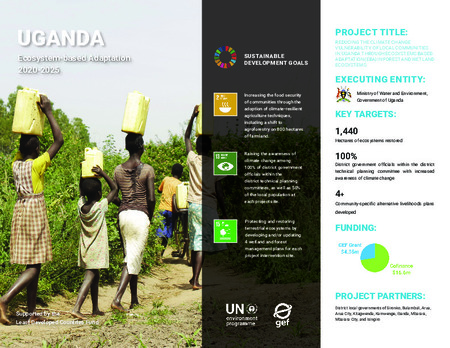Uganda: Ecosystem-based Adaptation 2020-2024

Date
2023-09Author
United Nations Environment Programme
Citation Tool
Bibliographic Managers
RT Generic T1 Uganda: Ecosystem-based Adaptation 2020-2024 A1 United Nations Environment Programme YR 2023-09 LK https://wedocs.unep.org/20.500.11822/43529 PB AB TY - GEN T1 - Uganda: Ecosystem-based Adaptation 2020-2024 AU - United Nations Environment Programme Y1 - 2023-09 UR - https://wedocs.unep.org/20.500.11822/43529 PB - AB - @misc{20.500.11822_43529 author = {United Nations Environment Programme}, title = {Uganda: Ecosystem-based Adaptation 2020-2024}, year = {2023-09}, abstract = {}, url = {https://wedocs.unep.org/20.500.11822/43529} } @misc{20.500.11822_43529 author = {United Nations Environment Programme}, title = {Uganda: Ecosystem-based Adaptation 2020-2024}, year = {2023-09}, abstract = {}, url = {https://wedocs.unep.org/20.500.11822/43529} } TY - GEN T1 - Uganda: Ecosystem-based Adaptation 2020-2024 AU - United Nations Environment Programme UR - https://wedocs.unep.org/20.500.11822/43529 PB - AB -View/Open
Item Statistics
Display item statisticsMetadata
Show full item recordDescription
Uganda is a landlocked country in East Africa with a population of around 48 million that is currently expanding at around 3.2% per year. Natural ecosystems, such as forests and wetlands contribute considerably to livelihoods and the economy in Uganda. Forests contribute ~6% of the country’s GDP, while natural resources from wetlands provide $432 per year on average to each Ugandan household. A project is aiming to increase the climate resilience of communities in Uganda through ecosystem-based adaptation (EbA), an approach of using nature and healthy ecosystems as part of an overall adaptation strategy to reduce the impacts of climate change on people. In addition to restoring damaged ecosystems, the project is promoting alternative climate resilient livelihoods to reduce pressure on nature and biodiversity.
Collections
Document Viewer
To read more, scroll down below.

